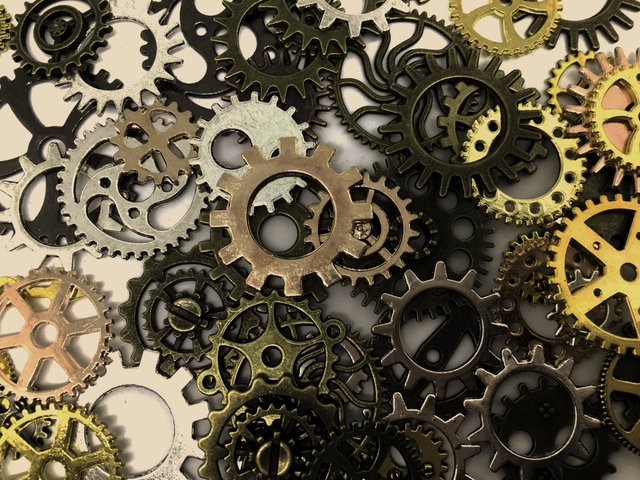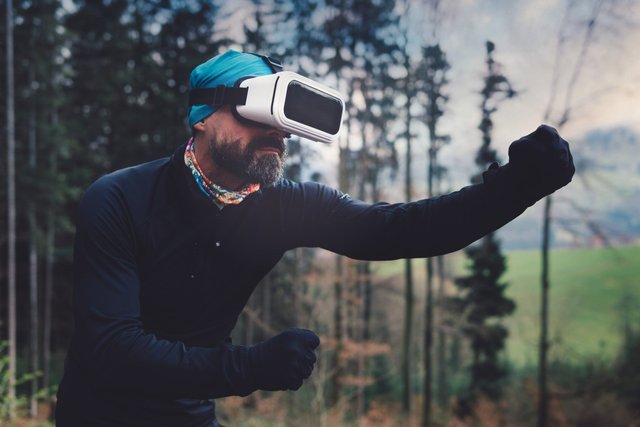ADSactly Tech News - Does Increased Access to Technology Increase Societal Inequality?
ADSactly Tech News: Does Increased Access to Technology Increase Societal Inequality?

Image Source: Pexels

It is funny to think that technology based on saving lives and improving the quality of life for people living on the planet could actually play an even bigger role in promoting inequality...
Just because the technology exists doesn't mean normal everyday people will be able to afford access to it. It boils down to a question that society must ask. Do you think everyone should have access to life saving technology no matter the cost? Who do you think should be responsible to pay for this access? Personally, I don't want anyone to die or suffer when there are treatments available to save them or ease that suffering.
I recognize at this time that this is an ideal of which I'm unable to provide a clear roadmap for achieving. However, in this article I will discuss the ways that modern technology may be promoting inequality and try to find some potential solutions to prevent that from being the case moving forward.
Apparently, the Committee for Economic Development of Australia (CEDA) recently issued a research report entitled 'How Unequal? Insights on Inequality.'
In this report, Nicholas Rohde and Lars Osberg proposed that different approaches to measuring inequality can lead to different views on its level and extent. But what does that mean?
Well I guess what they are saying is that it can be quite a subjective topic and data can be skewed without much effort.
One point the report makes is that inequality exists in Australia, and it also exists in every other country in the world. But the report also points out the fact that we need to be extremely sensitive and aware of the political nature that new emerging technologies have and how they may affect populations.



There is no doubt that there is rapid transformation taking place and new technologies are responsible for reshaping entire industries, forcing transition upon labour markets and even redesigning the way that we relate and communicate with each other.
Five decades of rising capabilities and falling costs in digital communications, information storage and data processing have given rise to a number powerful, multi-use technologies, such as machine learning algorithms, secure and distributed forms of data sharing and management, advanced materials, biotechnologies and neurotechnologies, among many others.
We are living in an age of smartphones, AI, robotics, genetic engineering and blockchain. These technologies are changing society in ways we can't even see or imagine but we will certainly be able to perceive them as they dig deep roots into everything we do on a daily basis.
The World Economic Forum makes reference to the idea above as the Fourth Industrial Revolution: a period of economic and social transformation on par with the industrial revolutions that ushered in the factory system, mass transport, electricity and sanitation and the digital economy.
In the next segment of my article, I will briefly discuss two different ways in which new emerging technologies have the potential to significantly impact inequality and widen the gap between the haves and have nots...


Firstly, the rapid adoption of artificial intelligence has the potential to exponentially increase unemployment along with other new and powerful technologies which are becoming available and happen to be must more cost efficient than traditional human labour.
If you're like me, it is hard to take statements like the one above as fact without supporting sources. Well, here's a statistic. According to the 2015 CEDA report regarding Australia's future workforce, its author, Hugh Durrant-Whyte et al, through statistical analysis found that "40 per cent of current jobs have a high probability (greater than 0.7) of being computerised or automated in the next 10 to 15 years".
This is an insanely high number and the amount of havoc this may reap on society will most likely be absolutely devastating. How can we stop this from happening? Well in regard to large corporations we will have a tough time doing anything to stop it all. But in regard to our communities we can make an effort to create human jobs and employ human labor, marking our products as 'made by humans.' We can also choose to only buy human made / handmade products and ban all others. This is a personal choice but if enough people did it, problem solved.
Of course the types of jobs being replaced by automation will most likely replaced by automation will be significantly low skilled jobs. This will overwhelmingly impact lower-income workers and create even more societal problems. As a result inequality would rise and give way to a new term i.e. technological unemployment and give way to the phrase — 'I've been replaced by machine.' When someone is asked what they do for a living...


A second way that technological advancement may increase social inequality is based on the idea that more productive capital in the form of robots, algorithms and automated factories could further shift returns in the economy away from workers.
Laura Tyson, a chairholder on the Council of Economic Advisers under former US president Bill Clinton raised an interesting question that pertains to the idea above, "who owns the machines?" Ownership of capital is already extremely concentrated and reducing human labor from the equation will only result in more inequality as owners find themselves even more wealthy and see increased income streams.
So what are some clear solutions to the problems mentioned above?
Admittedly I've borrowed these ideas from published work I've used to create this article with. I firmly agree with some of the solutions presented through the research of this topic. Ideas like focusing on augmenting rather than replacing workers is very important. Creating a social safety net which buffers affected workers and provides them with free or affordable training to transition into a new career is also a great idea. Improving education and focusing it on learning skills in which technology is unable to master or duplicate would be yet another idea to help combat these issues.
I don't know what my fellow @ADSactly society members think about all this but I would certainly like to know how they feel about technology as it relates to labor! Are you worried a robot may someday take your job?
What are your opinions about technology and its ability to further the inequality gap between the rich and the middle and lower classes?
Here's a chance for the @ADSactly community to leave their thoughts and opinions on this topic!
Thanks for reading.
Authored by: @techblogger
In-text citations sources:
"Inequality in Australia: four ways technology is creating a new divide" - ABC
Image Sources:
ABC, Pexels

Click on the coin to join our Discord Chat
<img src="https://steemitimages.com/DQmbjaMgp9TG7ZCasYVn2ATTzRPoWCeSkFjwhSUMvdkMJLA/FINAL-LOGO%20smallest.png" alt="Go
Adsactly" width="200" height="200" border="0">
Witness proposal is here:
Update witness&approve=1) to vote directly!
Witness Proposal
Witness Proposal
Go To Steem Witness Page
In the bottom of the page type: adsactly-witness and press vote.

Use small letters and no "@" sign. Or, click [here](https://v2.steemconnect.com/sign/account-witness-vote?witness=adsactly-
Thank you!


Unfortunately, inequality is actually since we are born. It is even beyond this technology "avalanche"... .
Have you ever wondered how is it possible that you are born in a country, in a family, in a community which gives you more opportunities to develop yourself, to grow and to make yourself richer and richer, but in other parts of the world there are other people born in an environment which does not help them that much! In very poor countries they are also much more numerous and they strive much more to get observed and have a job like someone born in better conditions.
There are plenty individuals who might be better than me at my job, but they do not get the chance to have this job, to grow, simply because they are born somewhere else with limited resources. I am always wondering ,why...?
And yes, the "new age" schools should teach children skills that could not be ever replaced by machines: creativity, spirituality, empathy... every individual should be let to learn through creativity, through discovering himself and its unicity...
Technology (broadly defined) includes everything from the Internet, computing, and communication, as well as the increased development and deepening of the capital markets (e.g., venture capital). Such technology has made it possible for a single person or a small set of people to have world-wide market presence, unlike anything in human history. For example, Facebook, Microsoft, etc. are able to reach the entire world to sell their products - something that was never possible before the introduction of the Internet. Similarly, Walmart has been able to achieve enormous economies of scale which have led to the "roll-up" of many family-owned small retailers.
Further, advances in computing power have eliminated many jobs, and not just those at the lowest levels. For example, the introduction of TurboTax and similar programs have displaced large numbers of accountants, while the development of legal search programs (such as RIA Checkpoint) has made outsourcing of law research ubiquitous, with the loss of many jobs for young attorneys.
Of course, technology has displaced many jobs that were l0w-skill or semi-skilled in nature. For example, the development of credit-card readers led to the demise of gas station attendants. And the rise of Amazon and similar on-line retailers have displaced many jobs in local businesses.
In fact, I hadn't even thought about this subject you're talking about, colleague @techblogger. We have to start thinking about what measures we need to take to avoid this conflict between the machines and the workers.
We also have to start thinking a little.... Governments will not be insane to implement these technologies and leave human workers without their jobs.
Like you said here:
Forty percent of the jobs... That'll be too many unemployed people. Imagine the disapproval governments would have if this technology were applied in this way....
I will tell you my opinion and the way I believe technology will be adopted in society.
In the next 10 to 15 years as you said, the machines will be implemented. But not to put people out of work. Governments will simply open up time to people so that they can study a university degree or dedicate themselves to a project that is approved, and in the meantime, the government will give them a pension as social security while the person is being prepared. So you can cover your food, rent and savings expenses (as if you were a formal worker).
This will sincerely be the way in which this technology will be adopted... Eliminating inequality and also making it easier for people to study and dedicate themselves to their projects.
The machines do not need salaries.... So I don't think it's wrong to give that money to a human who needs it to move forward. Companies and enterprises would continue to generate the same amount of money, and would also contribute to society. And this, gentlemen, I think it would be fair.
This is my very personal opinion...
Thank you @techblogger for writing about this topic. I thought it was very interesting. In fact, as I told you at the beginning, I hadn't even thought about it.
Greetings @adsactly and @techblogger! :)
I agree. The chance that we will see increased unemployment in our lifetimes is a statistical certainty. Will the rich have an even greater advantage over the poor due to new advancements in technology and the fact they will have access to it first. Yes.
That is correct.... Unfortunately, that will be the case. There will always be money as first interest.
This is one of the ironies of technological advancement - it gives opportunity but it also takes away opportunity. It gives opportunity, as you say, by giving unprecedented information access to anyone (with an Internet connection) but as technology advances, the discrepancy increases between those with Internet access and those without it - and the discrepancy even increases in between them! Faster and faster speeds means those with faster Internet can still outperform those without it, and having access at all beats out those with no access.
Jobs may be taken away, but jobs are also created. Although, the same idea applies - lower skill jobs that need more manpower vanish while fewer higher skill jobs come in as someone needs to maintain the robots. But the main way that robots are profitable if the overall labor costs go down so I would expect that there is still a net loss in jobs.
But that's not completely a bad thing - many manual jobs are fairly tedious, maybe dangerous, and some may argue a form of wage slavery where people must commit a part of their lives to slaving away at some tasks. If (a big if) a society was interested in the well-being of everyone, especially after an upcoming revolution in machine learning and artificial intelligence that wipes away jobs, then a share of these profits should go back to society in some way - they take opportunity, so it's fair to give some back. There's always even more work to do that currently has no pay, but this work is important like cleaning up our land and oceans that robots probably can't do anytime soon by themselves.
The opportunity and vision is there, it just needs someone with the means to care enough to do it.
I think everyone should have access to this kind of technology. Who decides that one person deserve better than the other?
If we had social democracy all over the entire world, we wouldn’t be asking this question. We know in capitalism this system doesn’t work. Only rich and corrupt can afford it. In socialism only powerful and the most corrupt can afford it. What about poor people, what about diminishing middle income people who can hardly afford health insurance, at least in NY.
Just a decade ago we had our first smartphone. I wonder what our world will look like in another 10 years. Flying cars? Banks being finally replaced by blockchain technology? My dream would come true lol. Perhaps at the end blockchain technology will solve the issue to everything, including technology involving healthcare. I definitely expect human jobs being replaced with computerization and AI. I recently read an article about robots to take 800 million jobs by 2030. I think it will happen much sooner. It’s scary, but it’s already slowly happening and it’s inevitable. Once this transition happens, something will have to change. There are already talks about universal income. We shall see.
Social inequality has existed since ancient times. This is facilitated by the place where you were born. That is, if you were born in a highly developed country with a high level of education, then you will strive to become better. The state will give you such opportunities - to grow and develop. But if you were born in a poor state, then it will be much more difficult for you to do this. Everything depends on the person and his potential. But recently there has been a big leap of technology. For example, the Internet provides opportunities for jelly people from all corners of the world. Industrial robots replace low-skilled workers. This may seem negative, but it's not entirely true. People are re-qualified for more "high" positions. That is, the overall level of human development becomes higher. But there is also the risk of an increase in unemployment. This is bad.
New technologies change everything. They change industry, approaches to work. In our time those people who do not develop have a risk of being out of work. Now it's important to constantly improve your skills. Get new skills and develop. Technologies change and it's important to realize this. In the future, many works will become irrelevant and will be replaced with robotic work. But together with this people will have to solve problems of employment of the population.
But in the future there will be other topical proffesions and this is a fact.
Good communication
Good afternoon @techblogger friend, I hope you are well, I remember a few days ago I read a post from the community of writers of @adsactly, I do not remember exactly if it was your authorship, but it was about transhumanism as a measure that could be applied in the future.
In turn I remember that I commented on it like all the post you publish, in my opinion I said that I did not agree with transhumanism, however I did agree with BIOTEGNOLOGY, since technology is used to improve the quality of life of human beings.
It is true.... technology is constantly advancing, so much so that we literally find ourselves in a certain way forced to advance with it, and from a certain point that is not bad, however the situation begins to get rough when we try to take this attempt to advance and generate quality of life further, obviously this not only happens in the health sector, but also in the social, economic (a clear example of this are the crytocurrency), among others, some have served as improvements, but other attempts have been unsuccessful.
Amigo @techblogger do not know if you agree with my opinion, but I sincerely believe that technology is an excellent tool as long as it is used properly, otherwise it will lead to total chaos.
To answer your question, I sincerely believe that technology should be within everyone's reach, of course with due moderation, I propose the creation of computer patterns that regulate technological use for different socio-intellectual classes, it is not the same to put technology in the hands of a specialized person as it is in the hands of a person who is not.
Greetings from Venezuela to you friend and to the whole community of @adsactly, they are appreciated, read and comment continuously, go on like this, their content is very good, they are the best!!
I agree that transhumanism could be a really scary science if applied in a nefarious ways. You are right to question it! I do remember interacting with you on that article and I was the one who authored it. I also feel that technology should be within everyone's reach but sadly the most advanced technology will remain in the hands of the rich for quite some time because it was their money that aided its creation often times..
It is true friend, basically the technology was developed thanks to the capital of the rich, although we will see what happens in a future, greetings from Venezuela. @techblogger
What a great topic, my friend. First let me answer the question: Yes, I think that people should have access to life saving technology.
Notice that I didn't say everyone. I said, people. So, why did I said that? Because, in this moment we are heading towards the road of unintellect, where we are forgeting what life and people are. We know that every job that can be, will be automatized, because the robots are cheaper and much faster than people.
So what is my big answer? Let's change the way we think and the way we feel for each other. Let's realize that life is sacred and it must be reachable to everyone, not just the elite... Let's educate our children what are the true real life values and they will create a new better system for all.
In this system, there is no good future for humans and this will be determined probably in next 100-150 years.. I hope that we will change our ways and create new better system in which is no problem that robot is working for you or instead of you..
Time will tell... :) Thanks for the great post @techblogger, really nice pick of topic! Have a great day!
Voted :)
What i Luv about económics And technologies is that is changing And adapting himself all the time im medical doctor And there are new software Who read the radiographies with more precisión that specialist by de recognizing patterns in It without making the human mistake of tirednes anxiety hunger ,,,the need to pee what im telling is that un glad to see that we are getting this tools And they. Make Us be more prepárate. In the actual world if we dont learn programation se are unalphabetics very interesting post have s nice day sir
Ki sob ajkubi comment koro friend. tumake latthi mara uchit. thanks